Chrono-nutrition during pregnancy and postpartum
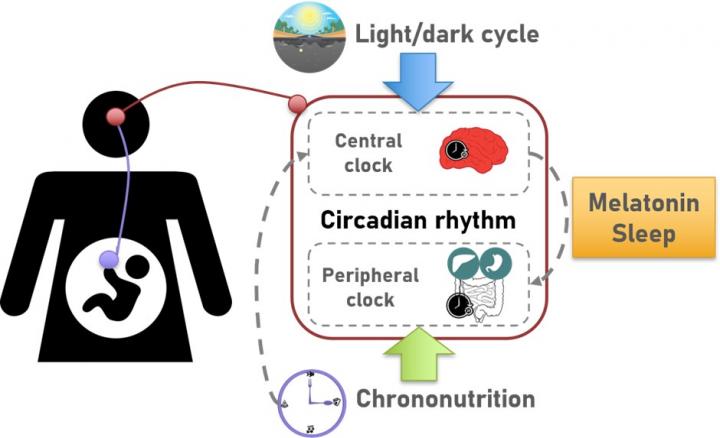
Chrono-nutrition is the science that studies the association between the timing of nutritional intake and the body’s natural circadian rhythms. The circadian rhythm is the body’s natural internal clock that coordinates various biological mechanisms such as hormone production, sleep-wake cycle, and metabolism. During pregnancy and postpartum, the influence of chrononutrition becomes even more critically important. There are numerous studies done to understand the effect and importance of chrono nutrition on the pregnancy, mother, and the fetus.
How sleep and diet is altered during pregnancy
Sleep and diet are two key factors which undergo changes during pregnancy and postpartum and can have implications for both maternal and fetal wellbeing. During pregnancy, pregnant women may experience various kinds of sleep disturbances such as decrease in sleep duration, quality, and efficiency along with increase in sleep disturbances. Similarly, food timing and the dietary component is altered to accommodate to increasing demands of the growing fetus.
Sleep disturbances and its effect on mother and fetus
Women experience changes in their sleep characteristics during and after pregnancy. Poor sleep quality could be due to short sleep duration, disturbed sleep, frequent waking up and night shifts. Poor sleep quality during pregnancy have been linked to increased maternal and fetal morbidity. It has been reported that disturbance in sleep alters the persons biological clock which in turn disturbs their hormonal and biological function.
Disturbance in circadian rhythm due to disturbed sleep is associated with increased risk of maternal disorders such as gestational diabetes, increased weight gain, preterm birth, depressive symptoms, and hypertensive disorder of pregnancy. It is also associated with increased risk of congenital anomalies in the fetus, low birth weight which in turn is associated with increased risk of intensive care admission, neonatal death, stunting in childhood and chronic diseases in adulthood.
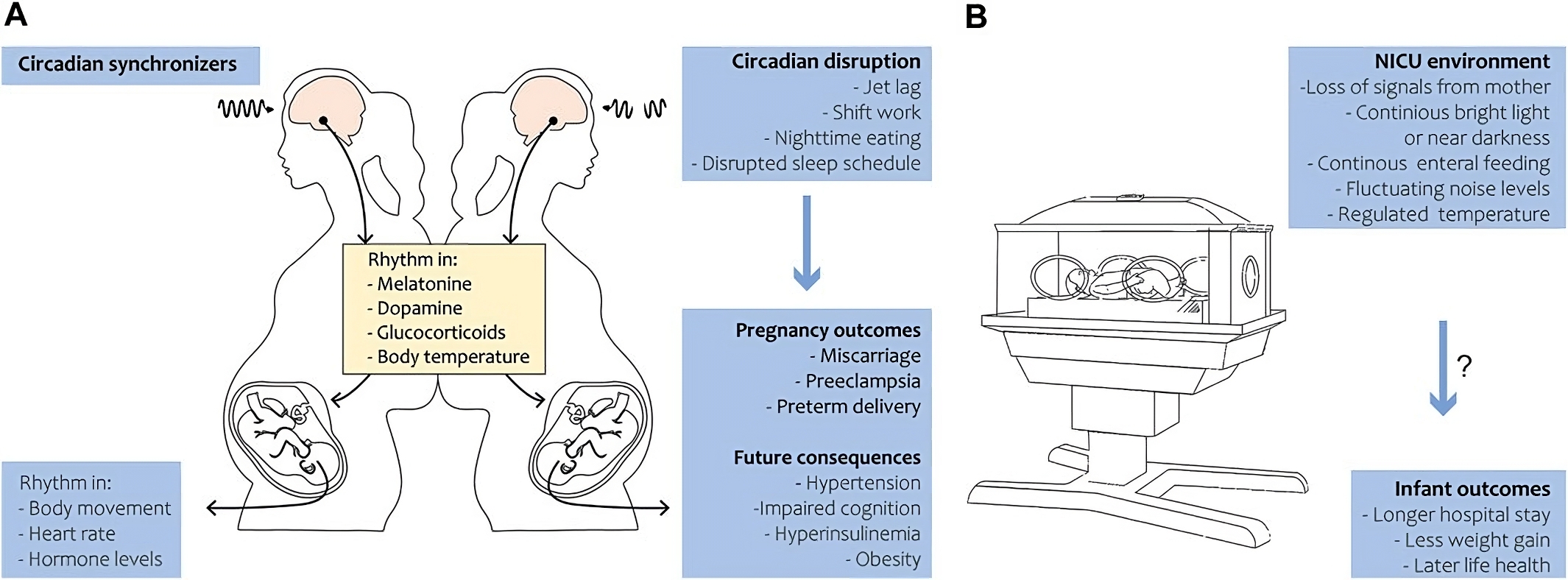
How meal timing influences maternal and fetal wellbeing
Regulation of a person’s circadian rhythm involves morning sun exposure and regular food intake. A pregnant woman’s circadian rhythm may be disrupted by skipping breakfast which can negatively affect the metabolic functions that eventually affects the fetus, since fetal health is also influenced by maternal circadian rhythm.
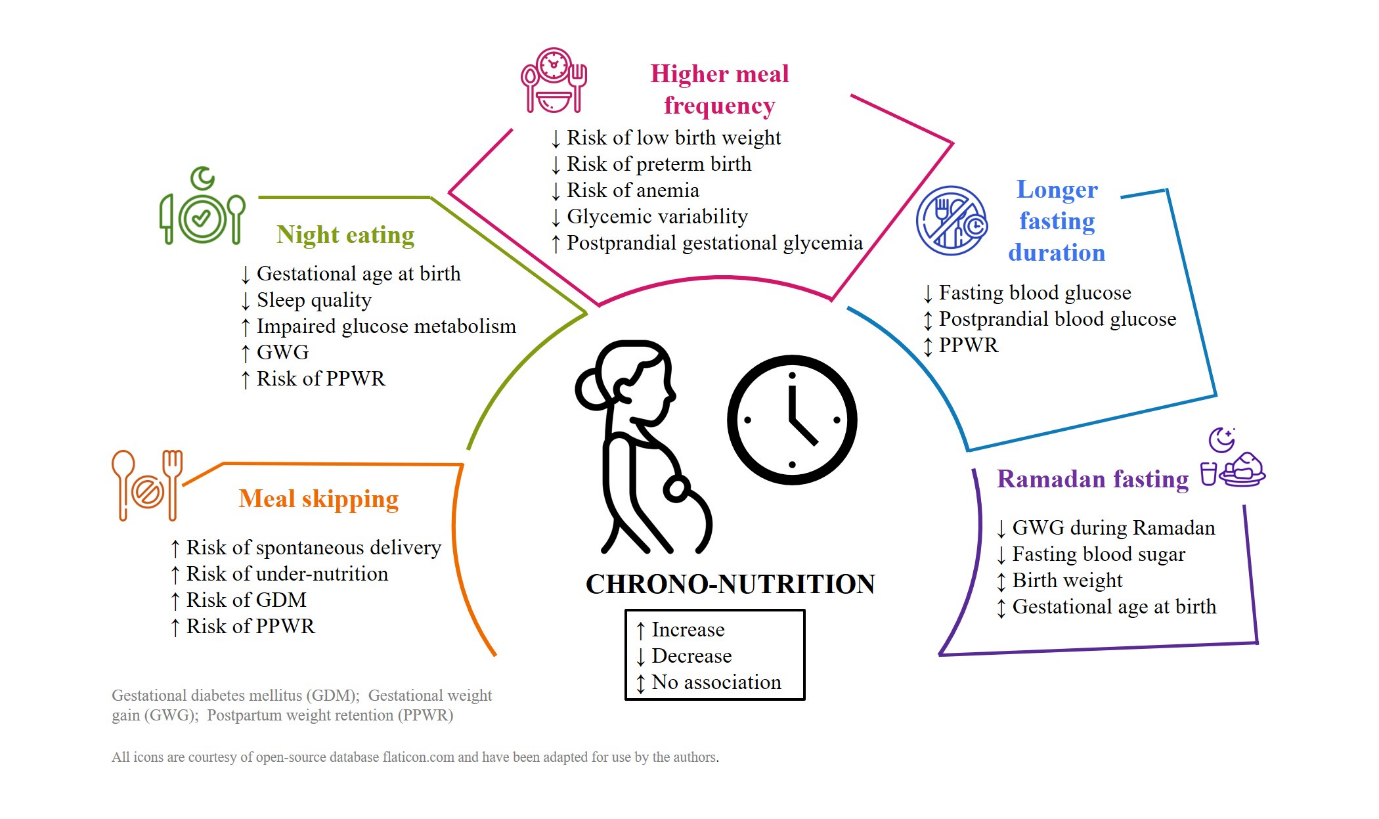
It has been reported pregnant women who skip breakfast have higher risk of developing gestational diabetes. The plausible mechanism by which the infant is affected could be as follows.
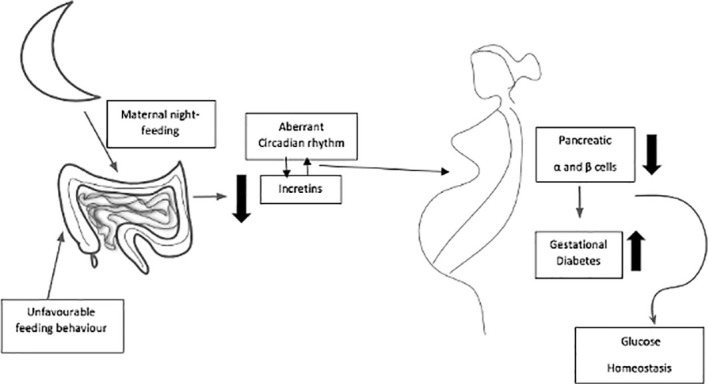
- Altered circadian rhythm in the mother affects the expression and function of clock genes which affects fetus’s internal clock that starts to form at around 20 weeks of intrauterine life. Studies have shown that sleep deprived pregnant women have increased risk of preterm delivery, abortion, delivery by c-section, low birth weight baby etc.
- Infrequent meal intake and skipping meal affects reproductive organ function. It disrupts the reproductive circadian rhythm and thus affects ovarian and uterine function. It also associated with poor blood flow to the uterus and placenta which can lead to placental abruption or decreased fetal weight gain.
- Infrequent meal intake affects the body’s inflammatory functions which there by affects the mode of delivery as well as fetal birth weight.
How night eating causes health issues?
Humans are evolved to rest in the night. Timing of nutrition intake is particularly important for supporting proper energy balance. Pregnant women are vulnerable to skip meals due to conditions such as morning sickness, loss of appetite and sensitivity to smell. In addition to this, disturbance in circadian rhythm during pregnancy due to bright light exposure, night shifts and travels can alter the circadian rhythm. Disruption in the circadian rhythm affects the enteroendocrine hormone secretion as well as gut microbiota which are essential for nutrient absorption. This causes impairment to the energy and glucose metabolism.
Is chrono-nutrition important during postpartum
After childbirth, mothers body goes through significant changes as it undergoes recovery from delivery and prepares to nurture the child through lactation. During this time, it is essential to consume a balanced and timely food intake that is aligned to body’s natural circadian rhythm for better healing, weight loss and recovery.
Chrono-nutrition in fetal, neonatal and childhood health
Circadian rhythm is crucial for maternal and fetal wellbeing. It is important for pregnant women to consume prompt nutrient rich food to support fetal growth and development. Studies have shown that maternal disruption of circadian rhythms due to late night carbohydrate dense food consumption, meal skipping and sleep disturbances due to light exposure and night shifts, are associated with lifelong consequences in the fetus. Maternal deficiency in important nutrients and chrono-disruption during pregnancy have been linked with stunting in children.
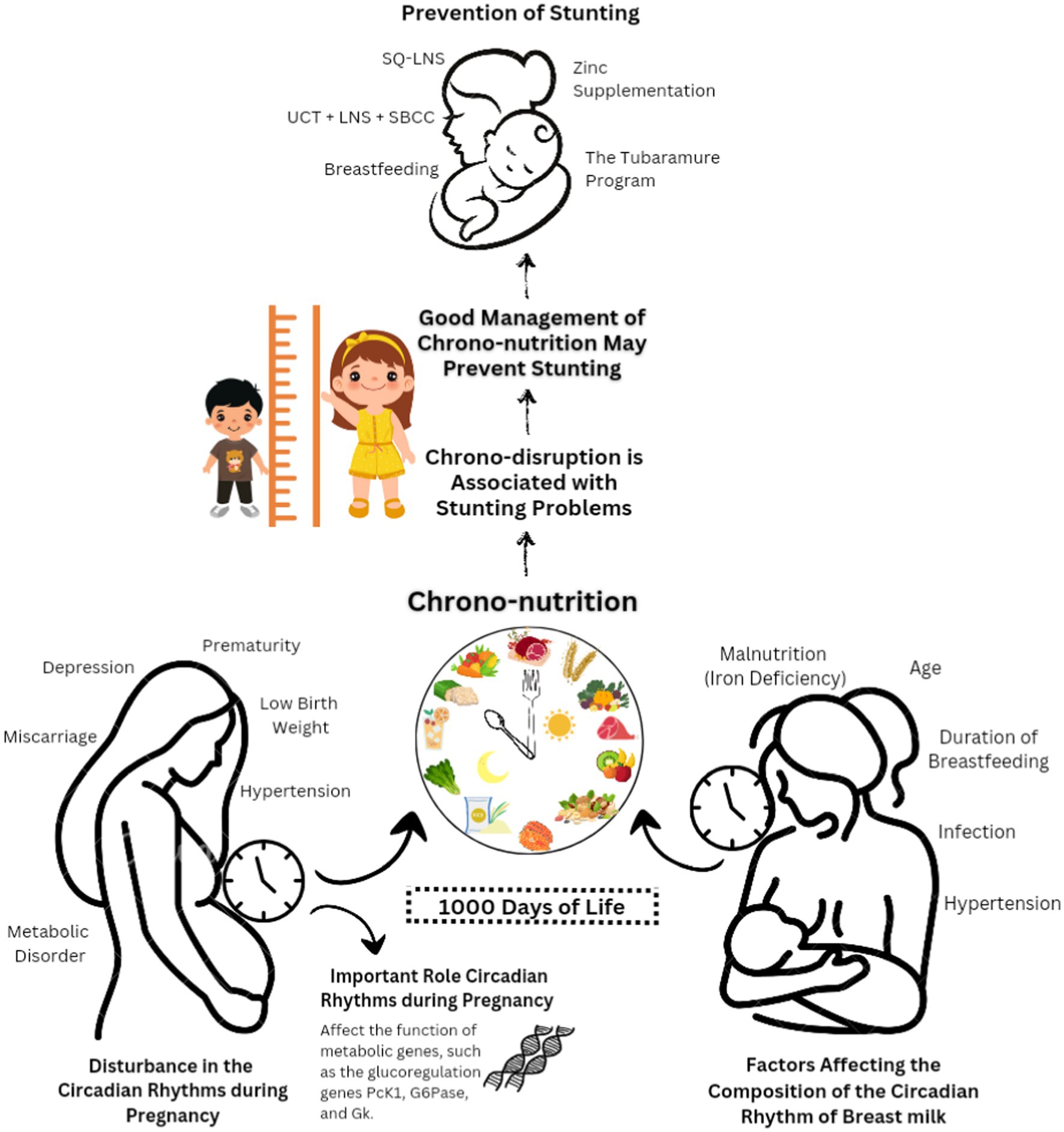
Circadian Rhythm of the fetus during intrauterine and postnatal period
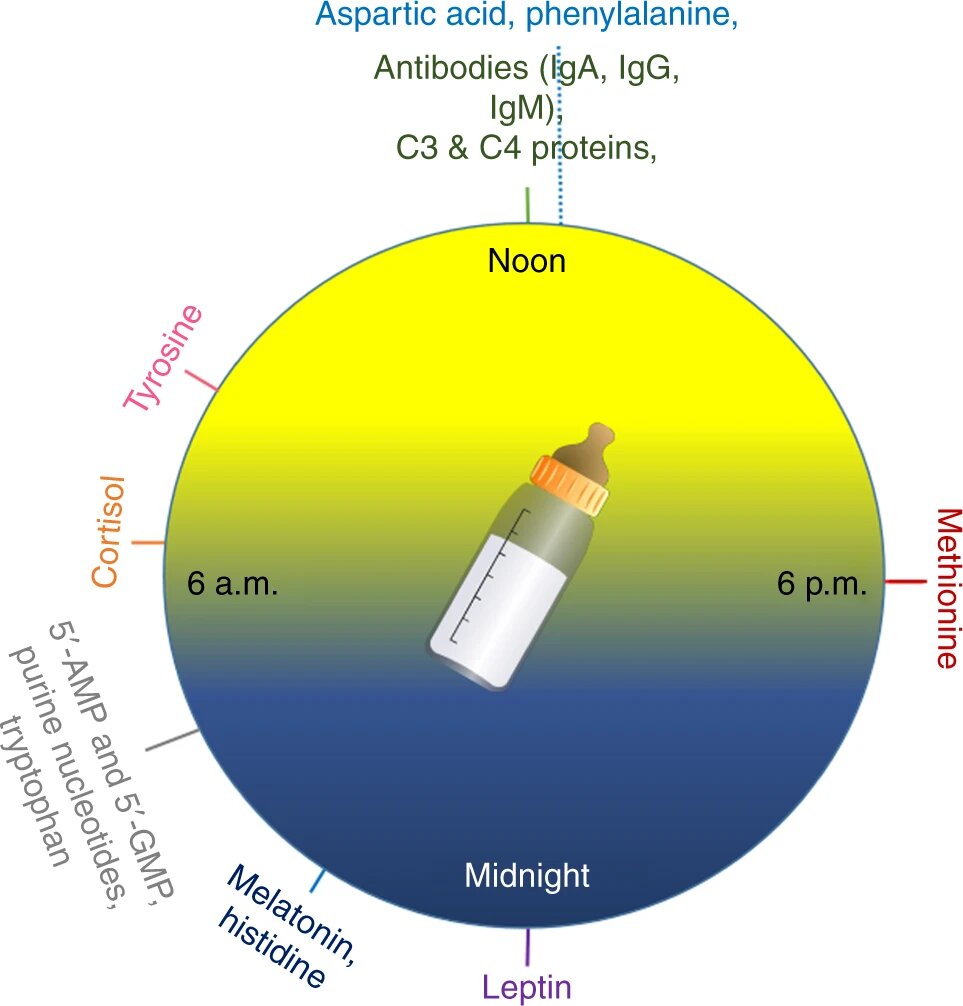
Baby’s circadian rhythm starts to form as early as 20 weeks of intrauterine life. During postnatal period, mothers milk shows variation in nutritional, hormonal and immunological contents throughout the day. It has higher cortisol content in the morning and higher levels of melatonin in the evening which is circadian-matched. Infants who ingest mismatched milk (such as pumped out morning milk in the night) may develop disruption to their circadian rhythms causing sleep disturbances and improper alignment with their environment. It has been shown that fluctuation in the light/dark intervals, hormonal content in the mother’s milk and other social environment influences the development of circadian rhythm in the infant.
chrono-nutrition and metabolic health in children and adolescents
There is potential effect of chrono-nutrition in physical and mental wellbeing of children. Synchronized circadian rhythm and chrono-nutrition is important for academic performance, psychomotor growth, and metabolic health. Studies have shown that chrono-disruption in children is associated with food addiction, obesity, poor academic performance, depression, and early onset of chronic-disorders.
Conclusion
Chrono-nutrition is important for overall well-being of the mother and child during pregnancy and postpartum. The implications of chrono-nutrition go beyond intrauterine life and extends throughout childhood, adolescents, and adulthood. It is important to adapt to nutrient rich food intake aligned to the body’s natural circadian rhythm for optimization of mother and child’s health and well-being.
Do you want to dive into the impact of nutrient intake on maternal and fetal wellbeing and unlock revolutionary newer field of chrono-nutrition and its potential uses in pregnancy? Join our world class Fellowship in Reproductive Medicine offered here at Medline Academics and equip yourself to lead with excellence in swiftly advancing field.
